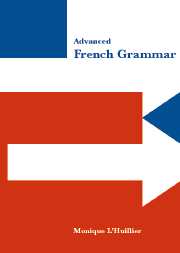Book contents
- Frontmatter
- Contents
- Acknowledgements
- Introduction
- 1 Framework
- 2 Verbs
- 4 Introduction to verbs
- 5 Present indicative
- 6 depuis and other tense markers
- 7 Future
- 8 Imperfect
- 9 Perfect
- 10 Past historic
- 11 Other past tenses
- 12 Subjunctive
- 13 Conditional and the expression of hypothesis
- 14 Imperative
- 15 Infinitive
- 16 Present participle
- 17 Past participle
- 18 Active and passive voices
- 19 Impersonal verbs and the impersonal voice
- 20 Pronominal verbs
- 21 Modals: devoir, pouvoir, vouloir
- 22 savoir and connaître
- 3 Determiners and prepositions
- 4 Nouns, pronouns and modifiers
- 5 Sentences and text
- Appendixes
- Bibliography
- Index
14 - Imperative
Published online by Cambridge University Press: 05 June 2012
- Frontmatter
- Contents
- Acknowledgements
- Introduction
- 1 Framework
- 2 Verbs
- 4 Introduction to verbs
- 5 Present indicative
- 6 depuis and other tense markers
- 7 Future
- 8 Imperfect
- 9 Perfect
- 10 Past historic
- 11 Other past tenses
- 12 Subjunctive
- 13 Conditional and the expression of hypothesis
- 14 Imperative
- 15 Infinitive
- 16 Present participle
- 17 Past participle
- 18 Active and passive voices
- 19 Impersonal verbs and the impersonal voice
- 20 Pronominal verbs
- 21 Modals: devoir, pouvoir, vouloir
- 22 savoir and connaître
- 3 Determiners and prepositions
- 4 Nouns, pronouns and modifiers
- 5 Sentences and text
- Appendixes
- Bibliography
- Index
Summary
Introduction
The imperative is a mood. It is used to give orders – to do or not to do something. It is also used to make a suggestion or express a wish. It is therefore generally used in spoken French in the presence of the interlocutor(s) to whom the imperative is directly addressed, i.e. 2nd persons singular and plural (tu/vous) and 1st person plural (nous). However, the imperative can also appear in written messages or quotations.
Ex: ‘La dictature, c'est ferme ta gueule, la démocratie, c'est cause toujours.’
‘Dictatorship = shut your mouth; democracy = talk all you like.’
The imperative has two ‘tenses’: the present and the past, and two ‘forms’: simple and compound. Both relate to the present of its utterance and the future of its realization. The tenses are opposed aspectually, i.e. the present is non-accomplished and the past is accomplished. The present imperative is by far the more commonly used.
The imperative has only three persons (instead of six for the other moods): 2nd person singular (tu), 2nd person plural (vous, including ‘polite’ vous) and 1st person plural (nous). Note that the subjunctive can be used as a substitute for the imperative for the 3rd person (see 4.4 below and chapter 12 Subjunctive, section 4.5).
In written French, imperative sentences normally end with an exclamation mark, a feature shared with exclamative sentences.
Present imperative
Formation
The forms of the imperative are based on those of the present indicative.
- Type
- Chapter
- Information
- Advanced French Grammar , pp. 192 - 201Publisher: Cambridge University PressPrint publication year: 1999



